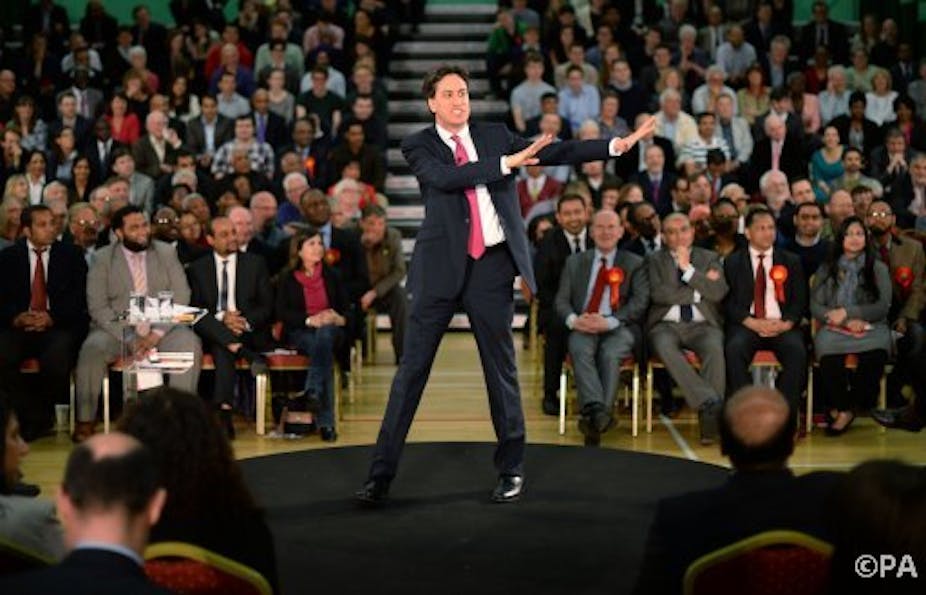Labour Party leader Ed Miliband, has responded to the electoral threat of UKIP with proposals to regulate the private rental market. By targeting the forgotten generation rent – estimated to include around 9m people – Labour is making a bid to reclaim the left-behind voters whom UKIP is so assiduously targeting.
In a speech launching Labour’s local and European elections campaign, Miliband outlined his proposals to set up three-year tenancy agreements, introduce a ceiling on rent increases and build 200,000 more homes per year.
The proposals were caricatured by the Conservative Party as “Venezuelan-style rent-controls” – but targeting “generation rent” and “hard working Britain” may yet prove to be a shrewd move.
By focusing Labour’s local and European elections campaign on the “bread and butter” issues of housing stock shortage, rising housing prices, zero-hour contracts and a widespread sense of general economic insecurity, Miliband is trying to diffuse the electoral challenge posed by UKIP. Recent opinion polls show that this challenge is very real. A Com/Res poll for ITV on 30 April put UKIP 11 points ahead of Labour, with 38% of voters saying they intend to vote for Nigel Farage’s party at the European and local elections on 22 May.
Labour clearly has a job ahead as it tries to win back core voters. Research conducted by academics Robert Ford and Matthew Goodwin shows that the average UKIP voter is white, male, middle-aged and working-class. In other words, he tends to be precisely the left-behind voter who was once solidly Labour but who now feels economically insecure – and abandoned by Labour’s middle-class, cosmopolitan and liberal values.
Since at least 2010, Labour has been agonising over this problem. Countless party seminars and debates have tried to find a formula to tempt back the five million voters the party lost between 2001 and 2010. But as the EU elections loom, many in the party are voicing concerns about Labour’s problems with left-out voters who may vote UKIP.
For instance, Labour peer Maurice Glasman has accepted that the party was seen as too middle-class “”), while Labour MP John Denham has admitted that it was not handling the UKIP threat well.
Making plans for Nigel
With Miliband’s speech, the party unveiled the formula it will use in response to that threat. The calculation is that by focusing on the cost-of-living crisis, they can avoid the trap of demeaning UKIP supporters by calling them racists and loonies. As opinion polls demonstrate, Nigel Farage’s party has so far proved impervious to this line of attack.
Labour is also clearly avoiding the folly of trying to outflank UKIP on immigration and the EU. The party’s immigration policy offers a subtle combination of restricted migrant access to benefits and a raised and better-enforced minimum wage. As for Europe, Miliband is clearly determined not to offer a referendum on EU membership, though he promises to work to reform the EU.
By targeting “generation rent” and portraying UKIP as “more Thatcherite than Lady Thatcher herself”, he is taking a direct shot at UKIP’s vulnerabilities. While Nigel Farage and his lieutenants have invested considerable resources in terms of pavement politics in the working-class midlands and north-east, they still have considerable difficulty attracting the support of younger and urban voters – precisely the electoral tranche Labour is now pursuing.
In addition, UKIP has also neglected its still-limited brand. For the moment, it has offered little more than an outlet to vent anger at Westminster politicians; it has little else to say to those left-behind voters that once voted Labour.
Of course, as opinion polls suggest, this electoral strategy may work on 22 May. After all, local and European elections have always been a chance for voters to bloody the noses of mainstream parties. But to do real damage to the Labour Party in 2015, UKIP will have to change some of its policies. It is unlikely that old Labour supporters will vote for a party that advocates introducing charges to the NHS, reducing workers’ rights and allowing bankers unlimited bonuses.
Aware of these challenges, Farage has started to soften some of the party’s stances on fiscal policy and public services; he has even expressed some support for the welfare state. This tonal shift is not risk-free. By attempting to secure the votes of forgotten working-class voters, UKIP risks alienating its core middle-class supporters from the south east of England – who remain attached to the party’s libertarian agenda.
For UKIP, these are long-term considerations. Labour, on the other hand, needs to set the tone for the 2015 electoral contest by coming first at the 22 May elections. It remains to be seen whether targeting “generation rent” and “hard working Britain” will help them pull that off.

